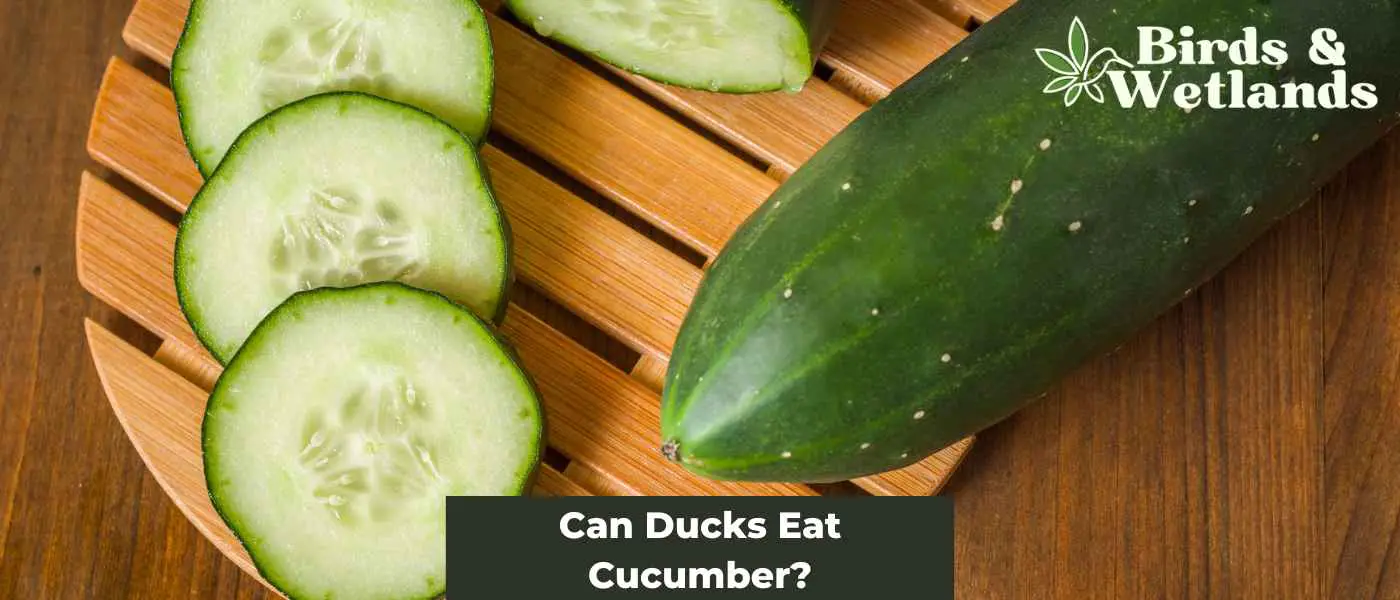Ducks are fascinating creatures with unique dietary needs and preferences. From seeds and grains to insects and snails, there is a wide variety of foods that ducks may eat in the wild.
But what about more unusual foods, such as cucumbers? Can ducks eat cucumbers, and are cucumbers good for the ducks’ health?
Yes, ducks can eat cucumber as it is a safe and healthy option for them. Cucumber contains water, vitamins, and minerals, making it a nutritious snack for ducks. However, it is essential to offer a varied diet, including aquatic plants, seeds, and insects, to ensure ducks receive all the nutrients they need to thrive.
Quick takeaways:
- Adult ducks (and geese) enjoy eating cucumbers, but it is important to do so in moderation.
- Cucumbers provide many health benefits to baby ducks.
- Mallards can eat cucumbers, but only as a treat.
- Pet ducks love the occasional treat of cucumbers as a healthy snack. This refreshing snack and other water-rich food can help keep ducks hydrated during the hot summer months.
- To feed cucumbers to ducks, they need to be cut into thin slices or small cubes so they can easily swallow them.
- Ducks can also eat cooked cucumber, provided that there isn’t any salt, pepper or other seasonings in it.
Can ducks eat cucumbers?
Yes, ducks can eat cucumbers. But are cucumbers healthy?
Cucumbers are good for a duck’s health, but some potential risks should be considered before feeding them to your feathered companions.
Cucumbers are high in vitamins and minerals like vitamin C, potassium, and magnesium. They also include dietary fiber, which can aid in digestion. All the nutrients are good for their digestive system and boost their immune system.
Cucumbers can be part 0f the diet of growing ducks consisting of aquatic plants, chicken feed, leafy greens and small fish. Ducks love the taste of a refreshing treat, especially on hot summer days.
Ducks require a balanced diet to keep healthy. Therefore giving them too many cucumbers may result in nutritional imbalance.
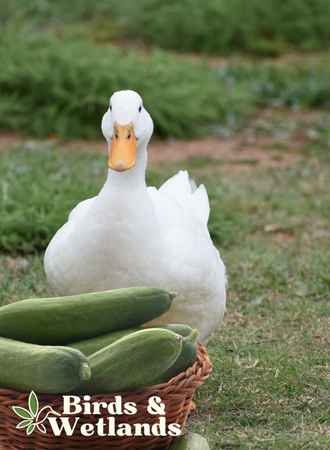
Can ducks eat cucumber skin?
Yes, ducks can eat cucumber skin, which is a healthy addition to their diet in many circumstances. Cucumber skin contains dietary fiber, which aids digestion, as well as minerals such as potassium, manganese, copper, magnesium, and phosphorus.
Most of these minerals are not naturally available to ducks in their everyday diets. Therefore eating cucumbers can help them get these essential nutrients. They also appreciate the taste!
Organic cucumber skin is always the best option, and it should be well washed before feeding it to your ducks to ensure that it is free of pesticides and other hazardous pollutants.
Can ducks eat cucumber leaves?
While they may be tempted to enjoy these flavorful greens, it is not a good idea. Cucumber leaves contain cucurbitacin, an organic compound that can be toxic to ducks when ingested in large amounts. Additionally, their bitter taste may not appeal to ducks.
To freely offer greens to your feathered friend without fear of toxicity, provide them with a balanced and varied diet that includes safer alternatives. Examples include leafy green veggies like lettuce, kale, collard greens, and spinach—these can be served fresh or wilted in combination with other vegetables, grains, and proteins.
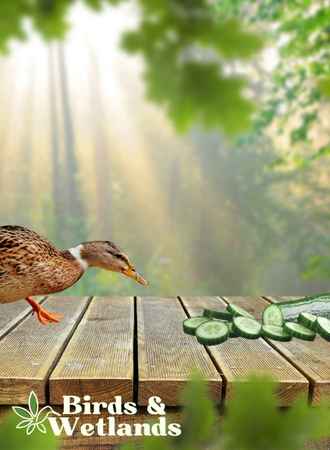
Can baby ducks eat cucumbers?
If you have been wondering, can ducklings eat cucumbers? Yes, they can. Cucumbers are a safe and healthy addition to the diets of baby ducks. At four weeks old, the ducklings can consume cucumber in small pieces, such as cubes or strips. This is important because large cucumber slices can lodge in their throats, causing suffocation. It may also cause digestive problems and an upset stomach.
However, cucumbers can give ducks essential vitamins and minerals for thriving growth with the right portion sizes and can be good supplementary food for commercial feed.
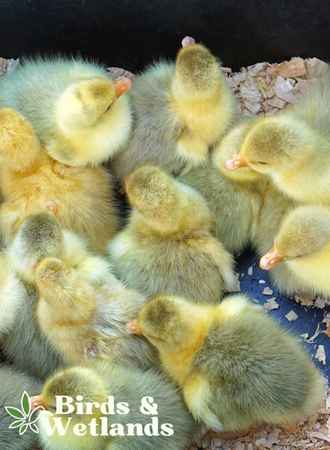
Can mallard ducks eat cucumbers?
Yes, mallard ducks can eat cucumber but only as a treat, especially on a hot summer day. Although cucumbers are not part of their natural diet, mallard ducks can safely consume them. It’s important to provide the cucumber unpeeled and cut into small pieces. This will help make it easier for them to swallow.
Aside from cucumbers, mallard ducks can benefit from other nutritious fruits and vegetables like apples and corn that can be incorporated into their regular diet.
How many cucumbers can ducks eat?
Ducks can eat cucumbers. But it is important to do so in moderation. While high water-content vegetables, such as cucumbers, can be a healthy treat, feeding them too much cucumber could potentially lead to health problems.
That being said, they can safely eat cucumber once or twice a week – once should provide sufficient nutrition. Excess cucumber consumption can result in nutritional deficiencies and digestive issues like bloating and diarrhea, so it is wise not to overdo it.
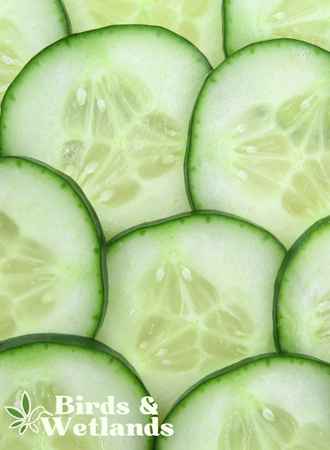
How often can a duck eat cucumbers?
Ducks can enjoy cucumbers occasionally, but there is an acceptable limit to how much they should consume. Any more than 10% of their diet should not constitute cucumbers or vegetables with similar water content. Offering cucumbers too frequently can negatively affect their health, so it’s best to stick with providing them once a week at most.
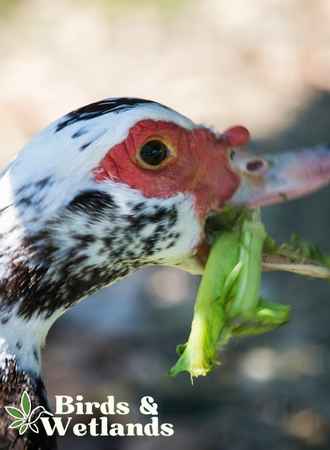
How to feed cucumber to ducks
You can feed ducks cucumbers by following these simple steps:
Choosing the right size. Cucumbers are best served to ducks when sliced into small pieces that can be easily swallowed. To ensure safety, it is important to ensure that the pieces are no larger than the size of a duck’s bill or head.
Preparing cucumber slices. To feed raw cucumbers to ducks, they need to be cut into thin slices so they can easily swallow them. Additionally, slicing them into small cubes will also help prevent choking hazards. It is important to note that some cucumber varieties may be too tough for ducks and should not be served.
You can also peel the skin off and offer cucumbers with just the flesh.
Presenting the food. Ducks tend to prefer food on the surface of the water instead of in their hands or on land. Therefore, it is best to offer cucumber slices floating in shallow water or along the edge of a pool or pond. This will also help keep their feathers clean and dry while they eat.
Boiling cucumbers. Another option for feeding ducks cucumbers is boiling them first until they become soft enough for easy digestion. Cooked cucumbers are good for ducks but should not contain any seasoning, such as salt and pepper.
Additionally, ensure all pieces are cooled down before being fed, as hot food could cause burning injuries on their bills or tongues.
Feeding supplements. Cucumbers alone do not provide all essential nutrients for ducks and other poultry birds and should not replace a healthy diet of seeds, fruits and vegetables. To ensure optimal health, it is important to supplement their diet with other foods, such as grains and legumes, which provide them with more energy and essential vitamins and minerals needed for development.
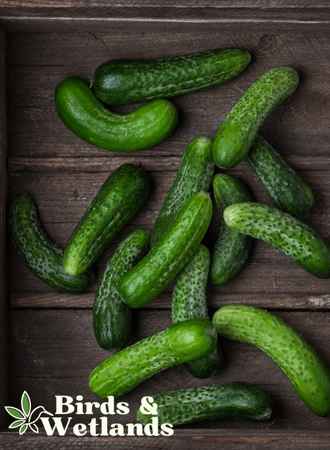
Other foods to consider:
Best Duck Feed Pellets
Are you a duck owner looking for the perfect feed to keep your feathered friends happy and healthy? Look no further than Purina Duck Feed Pellets! With their nutritionally balanced formula and high-quality ingredients, these pellets are the ultimate solution for providing your ducks with the nutrition they need to thrive.

Pros
- Complete Nutrition: Purina Duck Feed Pellets are nutritionally balanced to provide all the essential vitamins and minerals that ducks need to stay healthy and strong.
- Easy to Digest: The pellets are specially formulated to be easy to digest, which makes them ideal for ducks of all ages.
- Promotes Growth and Development: With its balanced nutrition formula, Purina Duck Feed Pellets are designed to support healthy growth and development in ducks.
- Suitable for All Breeds: Whether you have domestic ducks or wild ducks, Purina Duck Feed Pellets are suitable for all breeds of ducks.
- Trusted Quality: Purina has been producing high-quality animal feed for over 100 years, so you can trust that your ducks are getting the best possible nutrition with Purina Duck Feed Pellets.
Cons
- Cost: Compared to other types of duck feed on the market, Purina Duck Feed Pellets can be slightly more expensive. However, many customers feel that the high-quality ingredients and balanced nutrition formula are worth the extra investment.
- Pellet Size: Some customers have noted that the pellet size of Purina Duck Feed Pellets can be quite large, which may not be suitable for smaller or younger ducks. However, many customers have reported that the pellets can easily be broken up or soaked in water to make them easier to eat.
| Lettuce | Lettuce: A Healthy Green for Ducks? |
| Spinach | The Benefits of Spinach for Ducks |
| Peppers | Can Ducks Handle the Spice of Peppers? |
| Cauliflower | Cauliflower and Ducks: A Nutritious Combo? |
| Brussels Sprouts | Brussels Sprouts and Ducks: A Perfect Match? |

